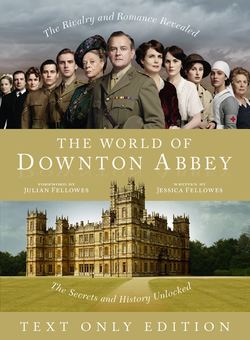Читать книгу The World of Downton Abbey Text Only - Jessica Fellowes - Страница 11
ОглавлениеBEHIND THE GREEN BAIZE DOOR
From the early hours of the morning until late at night, the servants are permanently on duty to attend to all the demands of the house and family. Below stairs, just a few moments of calm may be snatched during the day and are a welcome relief indeed.
Once the family have finished breakfast and gone about their business for the day, everyone has a list of chores to get on with until lunch. There is a brief respite for the servants’ midday meal at around noon before the machine is set in motion again for the family to be served their lunch promptly at 1pm. At about 4pm the servants are given bread and cheese by the cook and this must keep them going until they have their supper, a substantial two courses, but only after the family have finished theirs and the dining room has been cleared away. The crockery is brought downstairs for Daisy to wash up, but the glasses are left in the servery – they will be carefully cleaned the next day.
THOMAS
‘This isn’t her territory. We can say what we like, down here.’
Supper for the servants is always looked forward to – their work is over and it is the longed-for moment when they can all breathe, kick back and relax. It is also a time when the staff can have time to themselves away from the family and can indulge in some gossip about the goings-on in the house and amongst their employers. As Alastair Bruce, historical advisor, told the actors: for the servants, observing the family upstairs was the equivalent of watching Coronation Street or EastEnders today. But although the atmosphere is informal at the end of their working hours, lapses of manners are not permitted. Carson ensures that the servants of the house continue to reflect the gentility of the people they serve. A strict order of precedence is set around the table, just as in the dining room upstairs. Mrs Hughes sits at the right hand of Carson, the footmen sit by the butler, the head housemaid and lady’s maid by the housekeeper, with the lower-ranking servants at the other end of the table. In a house such as Downton Abbey, there is no concept of ‘off-duty’.
Knowing your place
On set, there is a genuine sense of an above and below-stairs division. On the first day Alastair Bruce divided the cast into ‘above’ and ‘below’ and they were put in different rooms to hear his talk on what life would have been like for them. Once they were filming, many of the below-stairs cast worked nearly all the time at Ealing Studios, rarely venturing to the big house to film at Highclere Castle, and vice versa. Lesley Nicol, who plays Mrs Patmore, says: ‘When you do a job like this, you start to take on the genuine feelings of your character. So when I went to Highclere, I felt very small indeed! It was overwhelming to be there.’
Away from the steaming hubbub that is the kitchen, the cogs of the estate turn at a rapid pace. Occasionally, the outside world intrudes. Deliveries are made throughout the day – newspapers early in the morning (The Times for his Lordship, The Daily Sketch for her Ladyship), fresh vegetables and meat from the home farm, produce from the dairy and goods from village shops. Post was delivered and collected twice a day – the family ‘posted’ their letters into a box in the hall, which had a sign on it: ‘Post will be collected at 9am and 4pm’. The butler took these letters, stamped them and gave them to the postman. The system was efficient – if a letter was received in the morning, a reply sent in second post arrived the next day. Telegrams were sent and received within hours; the footmen were dispatched to the Post Office with any urgent message to be relayed.
While Lord Grantham does not have a paid job – hence the family’s shock at Matthew Crawley’s intention to carry on his work as a solicitor – he is kept busy with the affairs of the estate. He is helped by members of the extended servants’ family: an estate manager who oversees the farm as well as the tenants’ cottages, and a gamekeeper who rears and protects the game and their cover for the shooting season, not forgetting the head gardener and his team of several under-gardeners. There are grooms, too, for the horses used for riding, hunting and to draw carriages.
Lady Grantham does not concern herself with the business of running the estate, but she has plenty of matters of her own that need attention. As the châtelaine, she is important to anybody who wishes to use the influence of the house – a fund-raising effort or the village flower show, for example. She also works closely with Mrs Hughes to ensure that any guests are well looked after, deciding which room they are staying in and which maid or footman will see to their requirements during their visit, if needed. Placement cards for the dinner table must also be written. Lady Grantham would also decide who to put next to whom at dinner, strictly observing the precedence of rank, of course. Whether entertaining visitors or not, each morning she would consult with Mrs Patmore in Cora’s sitting room for half an hour or so, and look over the day’s menu.
Siobhan Finneran is O’Brien
‘I loved filming all the scenes round the servants’ hall table. We all get on very well and there’s such a good atmosphere there, where you can get a bit lost at Highclere. I think we probably drove the directors mad because we’re all so noisy, but I think that helps the scenes.’
